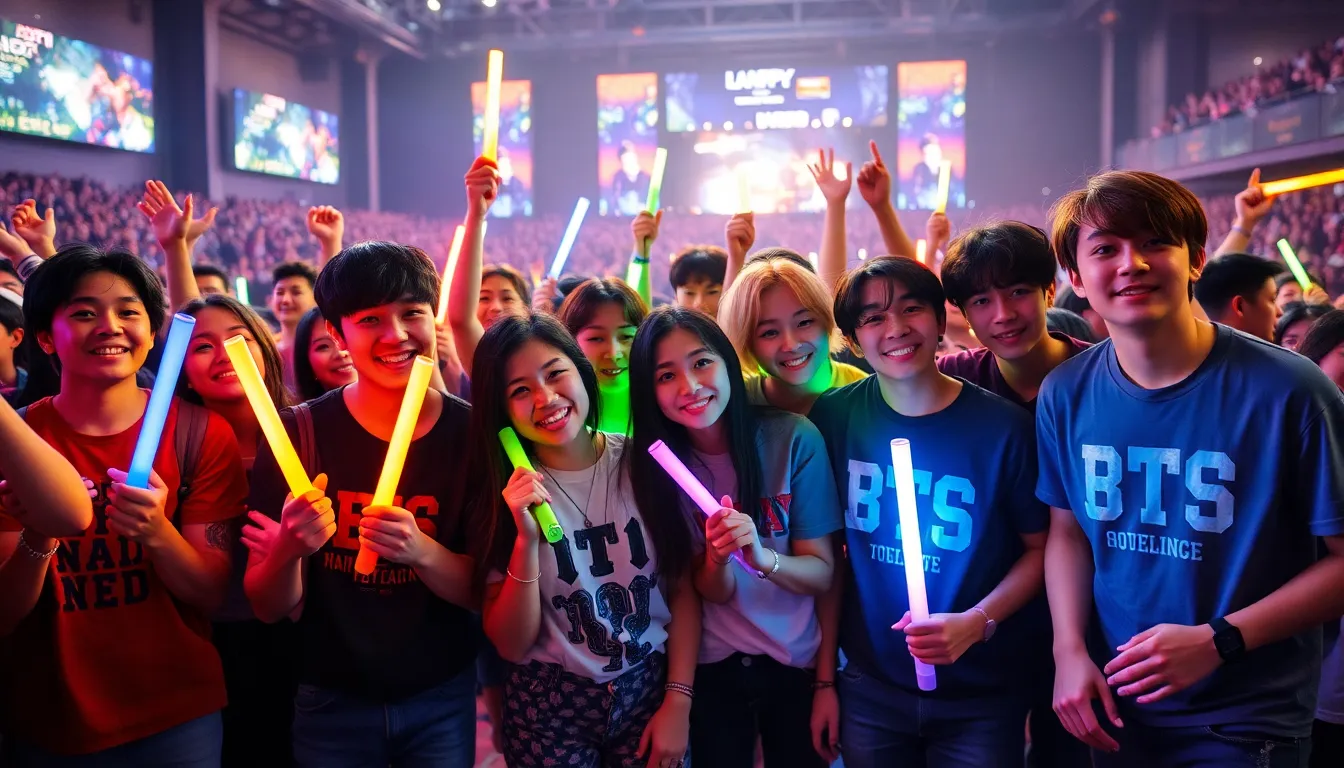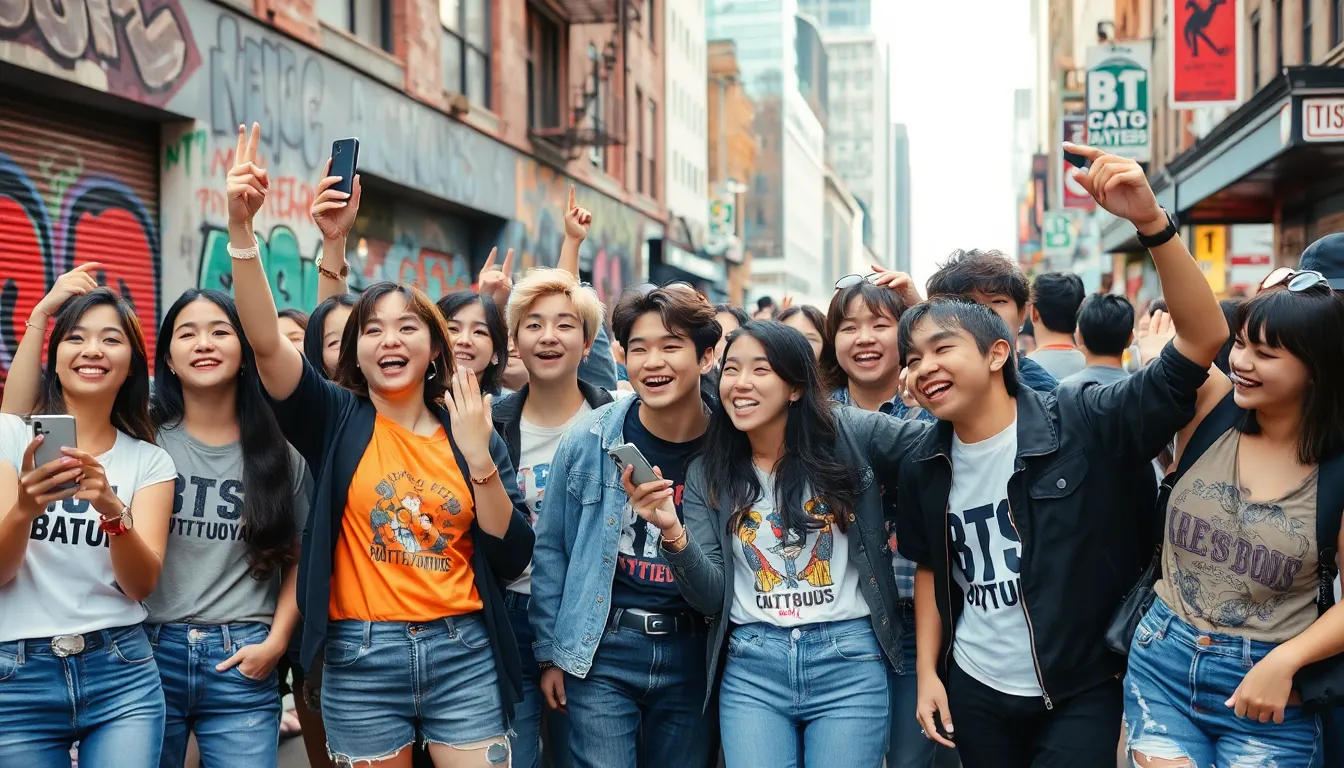In a world buzzing with abbreviations and slang, “BTS” pops up more often than a cat video on social media. But what does it really stand for? While many might think of the globally famous K-pop sensation, there’s a whole universe of meanings lurking behind those three letters. From “Behind the Scenes” to “Better Than Sex,” BTS has become a chameleon in the realm of slang.
Table of Contents
ToggleUnderstanding BTS in Slang
BTS primarily stands for “Bangtan Sonyeondan,” translating to “Beyond the Scene” in English. This definition resonates with fans of the global music phenomenon in various contexts. Beyond its association with the K-pop group, the acronym includes phrases like “Behind the Scenes,” often used in entertainment discussions. “Better Than Sex” appears frequently in casual conversations, often conveying enthusiasm or satisfaction.
Social media amplifies these meanings, integrating BTS into everyday dialogue. Users employ it in captions and comments, emphasizing their sentiments or reactions to different subjects. The versatility of this abbreviation showcases its relevance in both pop culture and informal communication.
In various online platforms, BTS captives the attention of diverse audiences. Examples include discussions around music videos and performances, where “Behind the Scenes” enhances engagement with content. Fans share insights about their favorite artists, highlighting personal connections that enrich the BTS narrative.
Many individuals interpret BTS differently based on context. In specific situations, it expresses admiration or excitement, while in others, it conveys a humorous or light-hearted tone. Recognizing these nuances allows for a deeper understanding of how slang evolves in digital spaces.
Communication shifts constantly, making slang like BTS an essential part of modern vernacular. Adaptation occurs as young people redefine phrases for unique expressions. This evolution reflects cultural trends and the dynamism of language in contemporary society.
The Origin of BTS

BTS carries significant weight in contemporary culture. The term has roots firmly planted in the K-pop landscape, signifying both the popular group and broader social trends.
Cultural Impact of BTS
BTS reshaped the global music industry. The group transcended boundaries, bringing K-pop into mainstream consciousness. Fans, known as ARMY, leverage the acronym in various contexts, whether celebrating a new album or discussing impactful lyrics. This engagement cultivates a sense of community across social media platforms. The reach of BTS extends beyond music, influencing fashion, language, and even mental health awareness. Their messages resonate deeply, promoting connection and understanding worldwide.
Evolution of the Term
The term BTS evolved significantly over time. Initially recognized mainly as an abbreviation for Bangtan Sonyeondan, it gained new meanings and relevance in online slang. Users adopted BTS to convey excitement, reflect on experiences, or engage in trends. As digital dialogue expanded, so did interpretations of the acronym, allowing it to encompass feelings and ideas beyond its original definition. This adaptability highlights the ongoing transformation of slang in the age of social media, proving its worth in contemporary communication.
Different Meanings of BTS
BTS possesses multiple meanings within contemporary slang. While it commonly represents the K-pop sensation Bangtan Sonyeondan, other interpretations exist.
Various Interpretations in Slang
“Behind the Scenes” often refers to unseen aspects of production processes. “Better Than Sex” expresses strong enthusiasm or pleasure. Text conversations frequently employ BTS to convey excitement, particularly among younger demographics. Different contexts shape these interpretations, amplifying the versatility of the acronym. Usage in various forms of communication illustrates how users adapt phrases to fit their expressions. Digital platforms contribute to this evolution, as slang morphs to align with trending topics and cultural references.
Examples in Popular Culture
Media appearances showcase BTS’s cultural relevance. Numerous artists and influencers reference the acronym in interviews, social media posts, and music. Popular TV shows highlight themes like “Behind the Scenes,” fostering audience engagement and curiosity. Advertising campaigns embrace the acronym to evoke familiarity and appeal to younger audiences. Music reviews often mention BTS when discussing artistic depth, capturing listener interest. Events related to the entertainment industry also utilize the term, reinforcing its connection to contemporary culture.
Usage of BTS in Social Media
BTS functions as a dynamic element in social media interactions. Its meanings adapt across various platforms and contexts.
Trends and Memes
Memes frequently showcase BTS as a humorous or relatable concept. These digital trends often highlight current events or pop culture moments, integrating BTS into everyday conversations. For example, a meme may depict a funny situation with a caption using BTS to emphasize excitement or disbelief. Users embrace this flexibility, adapting the acronym to suit diverse themes, which sustains its relevance. Through these memes, younger audiences engage with the acronym, strengthening the connection to cultural discussions.
Communicating with BTS in Online Spaces
Users communicate effectively with BTS across many online spaces, conveying emotion and context. When expressing joy or admiration, incorporating BTS into a caption or comment resonates with a mutual understanding. Social platforms like Twitter and Instagram allow for quick exchanges where BTS captures attention. Engaging with friends or followers comes naturally; people utilize the acronym to share experiences, from concerts to personal moments. This practice fosters community and connects fans sharing similar passions. Identifying BTS in tweets or posts creates an immediate impact linked to trending topics or reactions, amplifying its presence in the digital landscape.
BTS has become a multifaceted acronym in contemporary slang. Its origins in K-pop have expanded to encompass various meanings that resonate with diverse audiences. From expressing excitement with “Better Than Sex” to revealing insights with “Behind the Scenes,” the term’s adaptability is evident in everyday conversations.
As language evolves in the digital age, BTS serves as a prime example of how acronyms can transform and thrive across social media platforms. This dynamic nature not only reflects cultural trends but also fosters community among fans. Whether used to convey admiration or humor, BTS continues to play a significant role in shaping modern communication.



